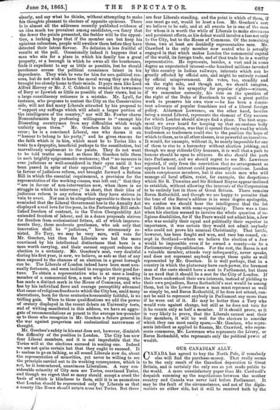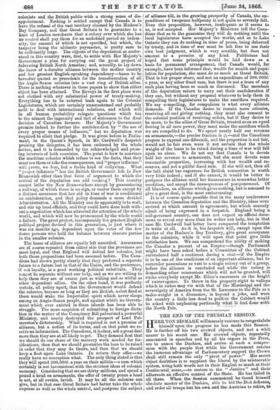OUR CANADIAN ALLY.
CANADA has agreed to buy the North Pole, if somebody else will find the purchase-money. That really seems to be the only result of the Canadian deputation to Great Britain, and is certainly the only one as yet made public to the world. A more unsatisfactory paper than Mr. Cardwell's despatch summing up the negotiations between the mother country and Canada was never laid before Parliament. It may be the fault of the circumstances, and not of the diplo- matists on either side, but it will be received both by the .colonists and .the British public with a strong sense of dis- appointment. Nothing is settled except that Canada is to have the refusal of the vast territory claimed by the Hudson's Bay Company, and that Great Britain is to guarantee to a knot of London merchants that a colony over which she has no control shall pay. them for. an undefined period an indem- nity, the amount of which is not specified, but which, the taxpayer being the ultimate paymaster, is pretty sure to be sufficiently large. The objects of the deputation as under- stood in this country were, first, to settle with Her Majesty's Government a plan. for carrying out the great project of federating British North America; and, secondly, to lay down the bases of a durable affiance between the mother country and her greatest English-speaking dependency—bases to be hereafter quoted as precedents for the transformation of all the Anglo-Saxon colonies into a vast ring of British allies. There is.nothing whatever in these papers to show that either object has been attained. The Envoys in the first place were not clothed with any substantial power of treaty-making. Everything has to be referred bank again to the Colonial Legislatures, which are certainly unaceustomed and probably unfit to deal with international relations, and which will in all human probability relegate questions which tax to the utmost the ingenuity and tact of statesmen to the final decision of Canadian farmers. Her Majesty's Government promise indeed to further the confederation by " the use of every proper means of influence," but no deputation was required to elicit that pledge. It was given before in Parlia- ment, in the Queen's Speech, in Mr. Cardwell's despatch praising the delegates, it has been endorsed by the whole nation, and it is demanded by the acknowledged and press- ing interests of both countries. The point is how to convince the maritime colonies which refuse to see the facts, that they must see them or take the consequences, and "proper influence" will prove, we fear, but a feeble kind of collyrium. What " proper influence" has the British Government left in New Brunswick other than that farce 9f argument to which the arrival of the deputation can add nothing ? This country cannot bribe the New Brunswickers except by guaranteeing a railway, of which there is no sign, or coerce them except by a distinct assurance that her aid in time of war is conditional on confederation, and that policy demands a more decided Administration. All the Ministry can do apparently is to wait, and stir up local officials, and they could have done both with- out a negotiation which has attracted the attention of the whole world, and which will now be pronounced by the whole world a failure. The great project, incomparably the greatest English political project devised in this generation, is just where it was six months ago, dependent upon the votes 9f the few dozen persons who hold the balance between obscure parties in.the smaller colonies.
The bases of alliance are equally left unsettled. Assurances are of course repeated from either side that the provinces are most loyal, and that England will defend her colonies, but both those propositions had been assumed before. The Cana- . diens had shown pretty clearly.that they preferred a separate future to a future lost in that of the Union, and the preference, if not loyalty, is a good working political substitute. They cannot be separate without our.help, and as we are willing to help them they are of course just as willing and as wilful as other dependent allies. On the other hand, it was perfectly certain, all policy apart, that the Government would defend the colonies, because as long as they are British, a shot fired at them would wake the Imperialist spirit which never sleeps among an Anglo-Saxon people, and against which no Govern- ment which ever existed in these islands has been able to struggle. The mere suspicion of submitting to foreign dicta- tion in the matter of the Conspiracy Bill pulverized a powerful Ministry, and nearly destroyed the prospect of Lord Pal- merston's dictatorship. What is required is not a promise of alliance, but a notion of its terms, and on that point we re- ceive no information. The Canadians, it is dear, ask &great deal more than they are at alI likely to get. They demand first that we should do our share of the masonry work needed for for- tifications, then that we should guarantee the loan to be raised in order that they may do theirs, and then that we should keep a fleet upon Lake Ontario. In return they offer—we really have no conception what. The.only thing stated is that they will spend 200,0001. a year on their militia—a sum which certainly is not inconsistent with the strictest ideas of colonial economy. Considering that we are thirty millions, and spend a pound a head on armaments, the offer of twenty pence a head is not, at all events, lavish. It may be all the colonies can give, but in that case Great Britain had better take the whole expense as well as the whole control, and postpone the subject
of alliance till, in the growing prosperity of Canada, the ex- penditure of twopence halfpenny is not quite so severely felt. Even this proposition, however, inadequate as it seems to us, is not accepted. Her Majesty's Ministers tell the Cana- dians that as to the guarantee they will do nothing until the local legislatures have accepted the works, and as to Lake Ontario they can do nothing in time of peace, being debarred by treaty, and in time of war must be left free to use their own best judgment, which is very sensible, but does not amount to a promise of any kind. Politicians had hoped, that some principle would be laid down as a basis for permanent arrangement, that Canada would, for example, have been informed that, wealth for wealth and poptir' lation for population, she must do as much as Great Britdil. That is her proper share, and •not an expenditure of 200,0004 a year, or any other fixed sum, but there is not a trace of any such plan having been so much as discussed. The members of the deputation return to carry out their confederation if they can, bat without any proposal whatever to help them in compelling their legislatures to make the sacrifices required. We say compelling, for compulsion is what every alliance demands. If the Canadas desire to remain mere colonies, receiving all and giving nothing, they must also consent to the colonial position of receiving orders, but if they desire to be more, to be the allies of Great Britain, treated as on an equal footing in all save power, they must make the sacrifices which we are compelled to do. We spend nearly half our revenue on armaments,—the precise fraction is 3,—and the Canadians- propose to expend one-fifteenth, and the proportion is not fair, would not be fair even were it not certain that the whole weight of the loans to be raised during a time of war will fall upon us alone. We do not say that Canada is to devote half her revenue to armaments, but she must devote some- reasonable proportion, increasing with her wealth and re- sources, and not a pitiful fixed sum. If she will not, then all the talk about her eagerness for British connection is worth very little indeed ; and if she cannot, it would be better to- postpone the alliance until her finances are in somewhat better condition, and accept the consequences of postponement. Of all blunders, an alliance which gives nothing, but is assumed to give a great deal, is the' most embarrassing. It is of course quite possible that in the many conferences between the Canadian deputation and the Ministry, ideas were arrived at which amount to agreements, but which scarcely admit of being expressed in a despatch. England being a self-governed country, one does not expect an official docu- ment to reveal any more than its writer can help, but in that case Mr. Cardwell had better have conquered the temptation to write at all. As it is, his.despatch will, except upon the matter of the Hudson's Bay Territory, give great annoyance to the colonists, while it will upon that • point give little satisfaction here. We can comprehend the -utility of making the Canadas a present of an Empire—though Parliament might have been asked before a Committee- of the Cabinet surrendered half a continent during a chat—if the Empire is to be one of the conditions of an 'important alliance, but to surrender possessions so vast to a single colony out of a group, before the alliance is concluded and while the colony is demanding other concessions which will not be granted, will strike everybody except Mr. Ellice'S successors as the height of extravagance. To throw in the property-right to valleys
which in riches may vie with that of the Mississippi and the sovereignty of America from the St Lawrence to the Pole as ft
make-weight in a discussion, is beyond a joke, aid were the country a little less dead to politics the Cabinet would be asked with unpleasin,g pertinacity, what' it had dolls With the North Pole. . ; •• • -































 Previous page
Previous page